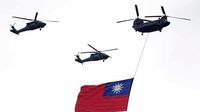In a significant move signaling Taiwan's escalating military ambitions amid rising regional tensions, President William Lai Ching-te announced on March 20, 2025, that the island's defense budget will exceed 3% of its GDP. This decision comes in response to an intensifying threat from China, which has ramped up military activities around Taiwan and emphasizes the necessity for Taipei to bolster its defense capabilities.
President Lai's announcement marks a critical shift from the previous allocation of approximately 2.5% of GDP to now over 3%. The increase aims to enhance Taiwan's military readiness as global scrutiny of China's assertive posturing grows. Lai stated, "We must enhance our military capabilities to protect our sovereignty and ensure national security in the face of increasing aggression from China." This statement underscores the imperative felt by Taiwan's leadership to practically respond to perceived dangers.
However, political infighting within Taiwan's own legislative body has hampered the timely implementation of this increase. Political challenges have surfaced as various opposition factions within the legislature, while generally supportive of increased military spending, have increasingly turned the defense budget into a point of political contention. This urgency to increase defense funding reflects Taiwan's commitment to solidifying its position as a frontline state in any potential conflict with China.
As the situation unfolds, Lai faces hurdles posed by these domestic divisions. Political analyst Alexander Huang pointed out that opposition lawmakers recently cut approximately 1.3% from Lai's proposed defense budget, which originally stood at NT$647 billion (approximately AU$30.8 billion), intending to make the increase less impactful amid concerns about government transparency and efficiency in spending.
Complicating matters further, recent legislative actions also froze a significant portion of Taiwan's submarine program budget, military operational expenditures, and funding earmarked for developing drone technology. Lai's proposals for increased spending are largely influenced by the Biden administration's expectations, notably articulated by Elbridge Colby during his Senate confirmation hearing, where he suggested that Taiwan should ideally be spending at least 10% of its GDP on defense—a notion many in Taiwan consider unrealistic.
The tensions are palpable in Taiwan's legislature, where overt hostility has been reported. Lawmakers have engaged in physical altercations while trying to debate amendments to defense spending, showcasing a disjointed national resolve at a time when unification under a strong defense strategy is crucial. "We cannot afford to appear divided in the eyes of our adversaries," warned Legislative Yuan member Fu Kun-chi, reflecting concerns that the visible discord could embolden China's ambitions.
Despite these challenges, Lai's determination to push for an effective defense strategy remains evident. The struggle for military funding also reflects broader tensions between pro-independence and pro-unification sentiments in Taiwan's political landscape, especially as Lai's Democratic Progressive Party (DPP) lost its parliamentary majority to the Kuomintang (KMT) and the Taiwan People’s Party (TPP) in recent elections.
Taiwan's history of underfunded military budgets since Tsai Ing-wen took office in 2016—when spending was only 1.82% of GDP—has been criticized for contributing to a lack of preparedness in the face of external threats. Tsai raised defense spending to 2.17% of GDP by 2023 in an attempt to rectify this, but further increases remain burdened by political maneuvering.
The urgency of enhancing Taiwan's military capacity is underscored by ongoing regional security dynamics. The United States has pressed for ally nations, including Taiwan, to bolster defense expenditures, and recent actions by China have focused attention on the necessity for a robust military stance in the region.
The current configuration in Taiwan's legislative body raises questions about how effectively resources can be allocated toward defense in light of political divisions. With inflation anticipated to rise approximately 2% in 2025, the challenge will be ensuring that increased defense spending does not compromise other critical areas of public expenditure.
Furthermore, if Taiwan's legislature should continue to resist Lai's defense budget proposals, it could weaken Taiwan's position internationally and undermine confidence among its allies in the United States and beyond.
The complexities surrounding Taiwan’s defense budget only highlight the delicate balance the island must maintain as it charts its future in an increasingly volatile geopolitical landscape. With rising calls from defense experts for Taiwan to significantly ramp up military spending, understanding political responses at home and international expectations will be crucial for fostering a cohesive and effective defense strategy.
As local opposition leaders wrestle with the implications of spending at unprecedented levels, it remains pivotal for Taiwan to communicate a united front—both to deter potential threats and to reassure international allies of its commitment to self-defense and stability in the region.








